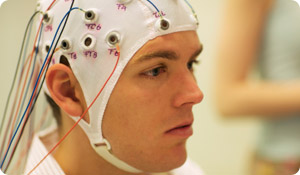
Picture the scene from TV. A patient suffering from some mental malady is holed up in a windowless office, electrodes placed strategically about her head, while a screen records responses to various stimuli. It's fiction, but the premise is anchored in scientific accuracy.
What is Neurofeedback?
The International Society for Neurofeedback and Research (ISNR) defines neurofeedback therapy (NFT) as a form of biofeedback that "uses monitoring devices to provide moment-to-moment information to an individual on the state of their physiological functioning." Essentially, neurofeedback works to alleviate irregularities in the brain such as depression, ADHD, and autism, by conditioning the patient's brain through a variety of patterned stimuli.
How Neurofeedback Works
Before any patient undergoes NFT, a doctor will provide an objective brain assessment to determine her psychological status. During the procedure, electrodes are placed on the scalp of the patient and are connected to a computer which will record the brain's activity.
Once the brain's activity is fed into the computer's software, subtle messages are sent from the machine into the patient to regulate abnormal brain patterns. According to the ISNR, depending on "various principles of learning, and practitioner guidance, changes in brain patterns occur and are associated with positive changes in physical, emotional, and cognitive states." The messages sent from machine to patient will vary depending on the condition of the patient.
Although the procedure may sound extremely complex, the intended results are not. NFT seeks to teach a brain with a particular abnormality how to behave normally.
Could It Help You?
Neurofeedback is very expensive and not many mental health professionals offer it. However, recent research has found the benefits of the treatment for people who suffer from:
- Attention deficit hyperactivity disorder
- Autism
- Epilepsy
- Depression
- Anxiety
- Post-traumatic stress disorder
-
Sleep disorders
Next Steps
If you think you could benefit from NFT, discuss an action plan with you doctor. She will provide you with the necessary information concerning the risks, the benefits, payment plans, and what you can expect from the procedure.
Sources:
Allen Press (2008, February 28). Neurofeedback Helps Those With Autistic Disorders





